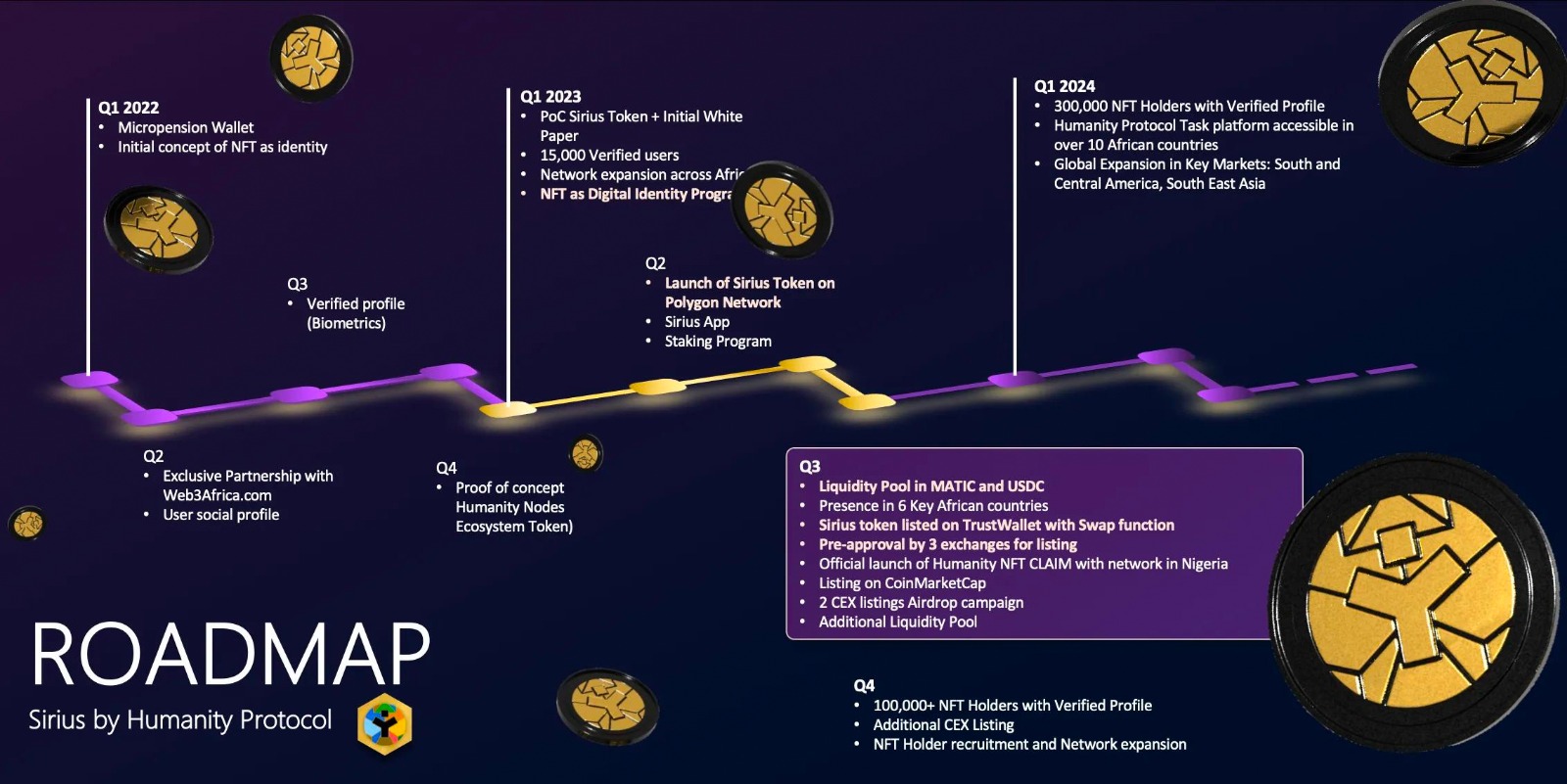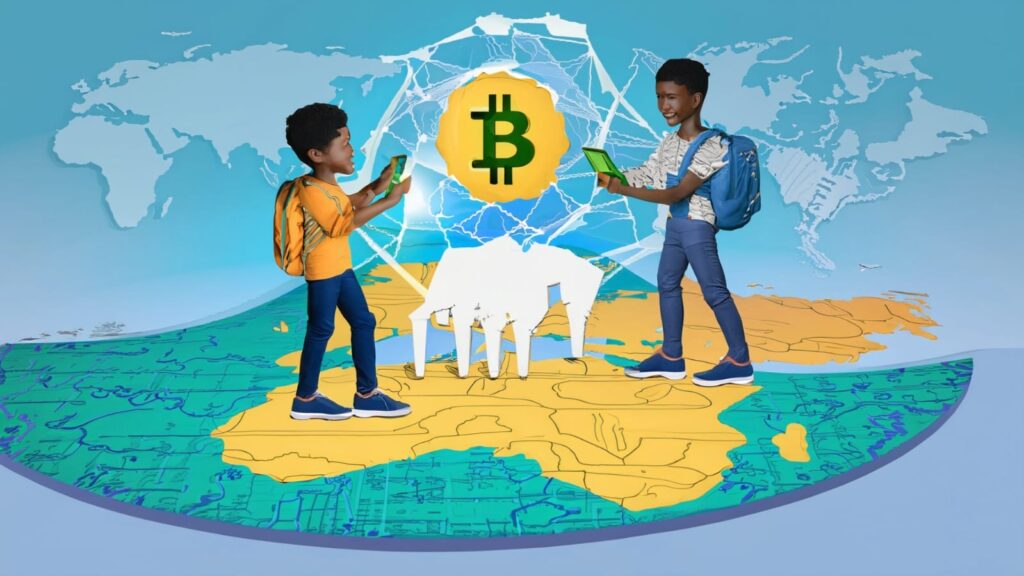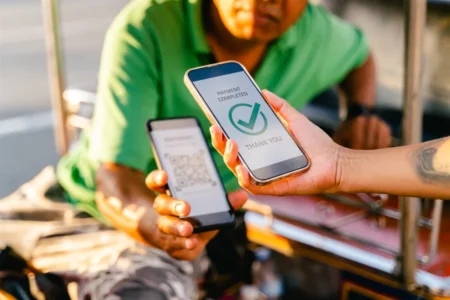- The SRS token, a groundbreaking innovation by the Humanity Protocol, is poised to usher in an era of decentralized prosperity.
- The rise of cryptocurrencies and decentralized financial systems in Africa is not just a trend; it’s a movement.
- The Humanity Protocol, with its trailblazing initiatives, has always championed the cause of financial inclusivity.
A new chapter is being written in the vast expanse of Africa, where ancient civilizations once thrived, and folklore has been passed down through generations. This chapter speaks of a financial revolution, a transformative movement that promises to redefine the continent’s economic landscape. At the heart of this transformation is the SRS token, a groundbreaking innovation by the Humanity Protocol, poised to usher in an era of decentralized prosperity.
Africa’s financial tapestry: a backdrop
With its diverse cultures, myriad languages, and a tapestry of traditions, Africa has always been a continent of immense potential. Its landscapes, from the Sahara’s golden sands to the lush rainforests of the Congo, tell tales of empires, migrations, and innovations. Today, as the world stands on the brink of a digital revolution, Africa is again at the forefront, ready to embrace the future.
The rise of cryptocurrencies and decentralized financial systems in Africa is not just a trend; it’s a movement. A movement that promises to unlock a trillion-dollar opportunity, reshaping the continent’s economic trajectory and placing it at the global economic discourse’s helm.
In just a year, from July 2020 to June 2021, Africa saw a surge in cryptocurrency transactions, reaching a staggering $105.6 billion. This isn’t just a testament to the continent’s adaptability, resilience, and vision for a decentralized future.
However, the recent collapse of FTX, one of the world’s largest crypto exchanges, and the subsequent plunge in significant crypto assets’ prices have reignited the debate on the need for robust consumer protection and regulation in the crypto industry. Regulating this volatile and decentralized system remains a challenge for most governments. Striking a balance between minimizing risk and maximizing innovation is crucial. Only a quarter of countries in sub-Saharan Africa formally regulate crypto, but as the data suggests, two-thirds have implemented some restrictions. Countries like Cameroon, Ethiopia, Lesotho, Sierra Leone, Tanzania, and the Republic of Congo have banned crypto.
Despite these challenges, Africa remains one of the fastest-growing crypto markets globally. With transactions peaking at $20 billion monthly in mid-2021, countries like Kenya, Nigeria, and South Africa are leading the charge. While many people use crypto assets for commercial payments, their volatility often makes them unsuitable as a store of value. Policymakers are also concerned about the potential misuse of cryptocurrencies for illegal fund transfers and circumventing local rules to prevent capital outflows. There’s also the fear that widespread crypto use could undermine monetary policy, posing financial and macroeconomic stability risks.
Also Read: African Startup League: Competition for funding over 10,000 startups every year
Countering inflation and embracing digital transformation in Africa
Inflation has been a persistent challenge for many developing nations, especially in Africa. Often subject to volatile fluctuations, traditional currencies have left citizens searching for more stable alternatives. This search has increased interest in cryptocurrencies, particularly Bitcoin, as a hedge against inflation. According to a report from Cointelegraph, Bitcoin offers a decentralized and finite supply, making it an attractive option for those looking to preserve their wealth in the face of rising prices.
Moreover, the International Monetary Fund (IMF) supports a global central bank-backed digital currency network. This move by the IMF indicates a growing recognition of the potential benefits of digital currencies, both for individual nations and the global economy. Such a network could provide a more stable and transparent financial system, reducing the risks associated with traditional banking systems. The state of blockchain in Africa is evolving rapidly.
From financial inclusion to job creation and wealth generation among the youth, blockchain offers transformative solutions. For instance, mobile money platforms like MPESA in Kenya have already disrupted the financial landscape in East Africa. Blockchain can further enhance transparency, accountability, and financial accessibility across the continent.
High inflation rates have plagued many African nations, with currencies like the Nigerian naira, Egyptian pound, and Ghanaian cedi experiencing significant depreciation. Cryptocurrencies, especially those with limited supplies and decentralized governance like Bitcoin, offer protection against such economic downturns. The unique combination of blockchain’s wealth preservation properties and the resilience of Africans can potentially spark a financial revolution on the continent.
The rise of Web3, the third generation of the internet, is also reshaping the African digital landscape. Web3 offers users ownership over personal data, money, and virtual assets, marking a shift towards decentralization. This evolution is evident in the growing popularity of peer-to-peer (P2P) trading in Africa, especially after regulatory challenges in countries like Nigeria. Platforms like Binance, Paxful, Yellowcard, and Localbitcoins have gained traction, facilitating crypto transactions despite governmental restrictions.
Political instability, often leading to inflation and currency volatility, is another challenge that blockchain can address. By promoting transparency in governmental processes, blockchain can restore citizens’ confidence and foster peace and development. Moreover, with a significant portion of the African population being unbanked, blockchain and crypto wallets present an opportunity to bridge the financial inclusion gap.
The SRS Token: A Visionary Leap

Amidst the plethora of digital currencies and blockchain innovations, the SRS token emerges as a beacon of hope and transformation. It is not merely a piece of code or a digital asset; it encapsulates a dream, a vision for a brighter, more inclusive African future.
The SRS Token, a cryptocurrency native to Africa, is poised to play a pivotal role in the continent’s financial landscape. With its decentralized nature, the SRS Token offers a transparent, secure, and efficient transaction means devoid of the challenges plaguing African traditional banking systems. The token’s underlying technology, blockchain, ensures that every transaction is recorded on a public ledger, making it tamper-proof and transparent. This transparency is crucial for a continent that has grappled with corruption and mismanagement of funds.
The Humanity Protocol, with its trailblazing initiatives, has always championed the cause of financial inclusivity. The SRS token manifests this commitment, aiming to bridge the economic divides and create a financial ecosystem where socio-economic barriers do not bind opportunities.
The transformative potential of the SRS token is multi-faceted:
- Financial Inclusivity: The token aims to democratize access to financial services. It seeks to ensure everyone can participate in the economic landscape, irrespective of their socio-economic background.
- Transparent Transactions: Leveraging the robustness of blockchain technology, the SRS token promises real-time, transparent, and secure transactions. This not only builds trust but also ensures accountability in the financial ecosystem.
- Boosting Investments: The agility, efficiency, and transparency of the SRS token are set to attract global investors. This influx of investments has the potential to drive Africa’s collective GDP to unprecedented heights, fostering growth and prosperity.
Moreover, the SRS Token is not just a medium of exchange but also an investment. As more people and businesses adopt it, its value will likely be appreciated, offering users an opportunity to grow their wealth. This potential for wealth generation can play a significant role in alleviating poverty in many African nations.
Furthermore, the SRS Token can be a catalyst for financial inclusion. A significant portion of Africa’s population remains unbanked population. As such, The token offers an accessible and straightforward way for people to access financial services. All one needs is a smartphone and an internet connection to transact with the SRS Token.
Decentralized finance: The New Frontier
The limitations and challenges of traditional banking systems have often been a roadblock to economic growth and inclusivity in Africa. High transaction fees, bureaucratic red tape, and limited access have left many of the population unbanked. Decentralized finance, powered by innovations like the SRS token, offers solutions to these challenges.
By decentralizing financial power and democratizing access, decentralized finance promises a landscape where opportunities are abundant and growth is collective. However, this path is not without its challenges. The regulatory environment for cryptocurrencies in Africa is still evolving. Some countries, like Kenya, are pioneering initiatives like “regulatory sandboxes” to foster innovation. However, others are treading cautiously, wary of the potential risks.
Also Read: African governments postponing an inevitable crypto world
Conclusion: Africa’s Tryst with Destiny
As the African sun casts its golden hues over the savannahs, it symbolizes more than just the dawn of a new day. It represents hope, promise, and a new chapter in Africa’s rendezvous with destiny. With the SRS token as the torchbearer, Africa is not just witnessing a financial revolution but actively shaping it.
The potential of decentralized finance, encapsulated in the trillion-dollar opportunity, is no longer a distant dream. It’s tangible, achievable, and within grasp. With the collective spirit of the African people, coupled with innovations like the SRS token, the continent is charting a course toward unparalleled economic prosperity.
For a deeper exploration of the transformative journey of the Humanity Protocol and the SRS token, visit here.











